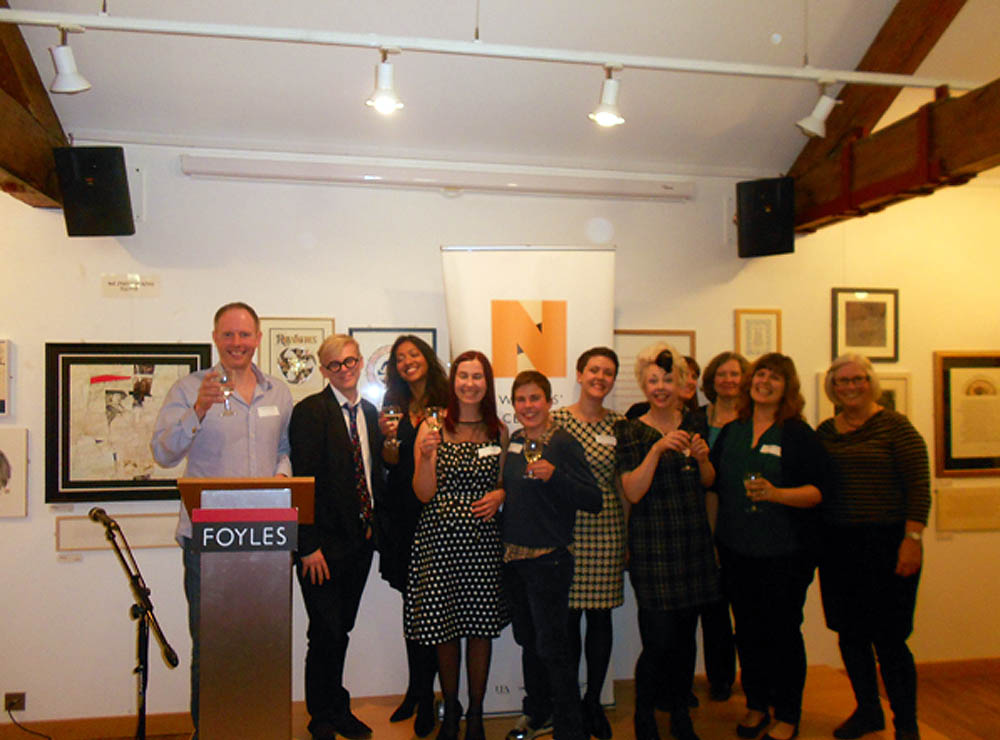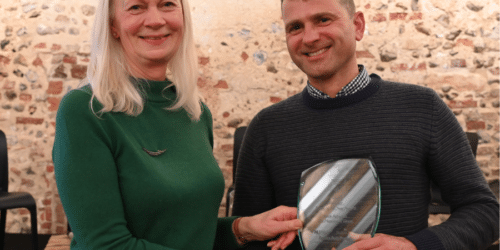
Escalator Literature offers ten winning writers a year of professional development, including one-to-one mentorship with a professional writer, a series of workshops designed to help the writers improve all aspects of their craft, support on applying for an Arts Council England Grants for the Arts award and the ever essential peer support.
Laura Stimson, Programme Manager at WCN, writes on our Escalator Literature Showcase, an evening event where our ten Escalatees read short extracts from their work to an audience of friends, family and literary agents.
On Friday we celebrated the end of the Escalator Literature programme with a showcase event in London. This sounds rather final but in fact, it felt like the beginning of things, with the ten Escalator winners spending the evening talking to agents and each other about what comes next. I came into the Escalator programme half way through, having been on maternity leave, but feel I’ve gotten to know the ten writers quickly. They feel like a group, each of them integral to the dynamic, each of them glad to be part of a cohort. They’re a lovely bunch.
Chair of Mentors Michelle Spring kicked off the readings by introducing her mentees. First, Mary Nathan, whose novel Michelle described as having a vivid sense of time and place. Mary read from a scene of her intricately visualized book that was rather aptly set just the other side of Charing Cross Road, where the showcase took place. ‘I smile widely enough so that it will reach my eyes,’ she read, as her protagonist battles inner torment in Georgian England. Next up, Bridport short story prize winner Lynsey White, whom Michelle described as having moved ‘confidently into the role of novelist’. Lynsey’s almost Dickensian story, gleaming with curses and extraordinary characters, nods towards gothic fantasy. The chapter she read from, entitled ‘Glass Worm’, contains the unique description of glass harpsichord, its melody ‘thin as a needle’.
Mentor Cathi Unsworth introduced her mentees with trademark wit, vigour and lyrical dexterity. Cathi mentored talented namesakes Megan and Meghan. UEA graduate Megan Bradbury’s book is a fact/fiction mash-up; perhaps too casual a term for her agile, sophisticated prose. Amongst other things, it is a sparkling psychogeography of New York city; weaving the reader through this ‘gap toothed’ city. ‘How long will it sit like this, straddling the seasons,’ one line asks. Cathi describes Meghan Purvis’ prose as ‘muscular’, a perfect expression for her book, a vampire novel which ‘swaggers the badlands’ between gothic contemporary noir. Meghan read from a scene which snagged us all; visceral, vibrant, menacing; a real cliff-hanger.
‘a vivacious, funny, often sad story’
Like many of her Escalator contemporaries, L.E. Yates’ book re-tells history. Her novel From the Mountains Descended Night is framed by one of the greatest literary scandals of the eighteenth century, a story which her mentor David Rain described as ‘highly original, grippingly readable.’ Her scene describes an interaction between James McPherson and Samuel Johnson, in which Johnson first accuses McPherson of having created fiction. Jonathan Curran’s book is another fiction underpinned by real events; the fall of Baghdad in the 13th Century. Told through the eyes of a boy, it describes what was once a city bright with science, philosophy, and learning, destroyed by cataclysmic political events. As his protagonist daydreams the horrors to come, he imagines fires burning ‘high and bright inside his eyelids’.
Tobias Hill’s first mentee, Kyra Karmiloff also uses real world scandal to frame her novel. Set in the days of the Witchfinder, her book unpicks the delicate and destructive relationship between siblings. Kyra read from a scene describing ‘barber surgeons’, the game the siblings play, which involves lathering their bodies with lye suds and ‘shaving’ their bodies, removing the soap. Sue Healy, Tobias’ second mentee, read a hilarious, beautifully constructed scene from her book, The Hole in the Moon. It’s a vivacious, funny, often sad story of dwarfism, brotherhood, pornography, love and destruction. ‘Abroad shouldn’t be rainy,’ protagonist Dan P contemplates, on arriving into Hungary, ‘abroad should be roasting.’
Mentor Natasha Cooper worked with two historical novelists. Ian Madden’s story is a fictional look at the real life relationship between artist JMW Turner and ‘the woman who was not his wife’, whom he lived with. The scene he read from, a wonderful illustration of the passion and eccentricity of an artist, did something rather clever; it allowed the listener to omit the male voice and transport firmly into the mind of the female protagonist. We finished the night’s readings with Linda Spurr, whose story set in ancient Arabia, tells of woman’s struggle for autonomy. Using scent as its driving force, which she writes about with great agility and beauty, hers is a love story to frankincense and one woman’s ambition to capture it.
It was a special evening. Special because it marked the culmination of the programme. Special because it allowed the authors to meet and talk with agents. Special because they genuinely enjoy each others’ company and have formed a true cohort. Special because listening to ten authors read may, on paper, sound excessive but was in reality a delight. One which was over all too soon.
‘The Meaning of Geese’ wins East Anglian Book of the Year 2023 The debut book from Norfolk conservationist Nick Acheson is crowned the overall winner of the East Anglian Book Awards 16th February 2024 Announcing the category winners for the 2023 East Anglian Book Awards Discover the six winning titles for the East Anglian Book Awards 2023 18th January 2024You may also like...








